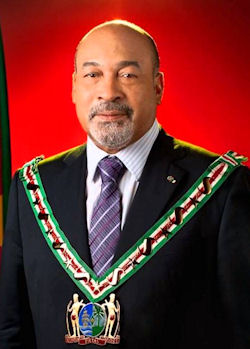Désiré "Dési" Delano Bouterse
 Desi Bouterse, coup leader in 1980, military strongman from 1980 to 1992, and later opposition leader and parliamentarian, remains a prominent figure in Surinamese politics, whether delivering bombastic speeches or goading his National Democratic Party (NDP) to try to force the government's resignation. Often disappearing into the unpatrolled, forested interior of the country, Bouterse is the subject of rumors ranging from likely true: drug trafficking and alliances with the FARC -- to speculative: contracting Guyanese assassination squads, organizing Amerindian uprisings, and planning arson attacks on the Surinamese judiciary's homes.
Desi Bouterse, coup leader in 1980, military strongman from 1980 to 1992, and later opposition leader and parliamentarian, remains a prominent figure in Surinamese politics, whether delivering bombastic speeches or goading his National Democratic Party (NDP) to try to force the government's resignation. Often disappearing into the unpatrolled, forested interior of the country, Bouterse is the subject of rumors ranging from likely true: drug trafficking and alliances with the FARC -- to speculative: contracting Guyanese assassination squads, organizing Amerindian uprisings, and planning arson attacks on the Surinamese judiciary's homes.
Désiré “Dési” Bouterse was born on 13 October 1945. Dési Bouterse, later president of Suriname, did not complete high school and was conscripted into the Dutch army in 1968. He then went to the Netherlands to undergo military training. On 25 February 1980, 16 non-commissioned officers overthrew the elected government. The military-dominated government then suspended the constitution, dissolved the legislature, and formed a regime that ruled by decree. Although a civilian filled the post of president, a military man, Desi Bouterse, actually ruled the country.
Throughout 1982, pressure grew for a return to civilian rule. In response, the military ordered drastic action, the authorities arrested and murdered 15 prominent opposition leaders, including journalists, lawyers, and trade union leaders. In the night of 8 to 9 December 1982, 15 opponents to the military regime (lawyers, journalists, soldiers) were kidnapped and led to a military base where they allegedly were tortured and executed. These events are known as the “December murders”.
While Bouterse has admitted "political responsibility" for the 1982 killings of fifteen opponents of his then-military government and offered a public apology, he continues to deny personal involvement. Eyewitness reports place him at the site of the killings, and one rumor circulates that Bouterse castrated one victim before killing him.
In 1983, United Nations’ Human Rights Committee (UNHRC) declared that the “December murders” constituted an arbitrary deprivation of life according to article 6 (1) of the International Covenant on Civil and Political Rights, and required Suriname to investigate those crimes. Following the murders, the United States and the Netherlands suspended economic and military co-operation with the Bouterse regime, which increasingly began to follow an erratic but generally leftist political course. Economic decline rapidly set in after the suspension of economic aid from the Netherlands. The regime restricted the press and limited the rights of its citizens.
Continuing economic decline brought pressure for change. The military eventually agreed to free elections in 1987, a new constitution and a civilian government.
Accusations that the CIA tried to overthrow the Bouterse military regime have been a common theme in the past for Bouterse's party, and materials discussing various theories can be found on the internet. Portions of the Surinamese press picked up on the accusations uncritically, referring for example to the "CIA coup" as if it were an accepted part of Surinamese history. Meanwhile, Bouterse and his party kept up a steady stream of negativity about the U.S. and the Netherlands.
Despite his baggage (the December 1982 murders and the 11-year jail sentence in absentia), the charismatic Bouterse remained popular nationwide. Bouterse failed in his attempt to control the Presidency through former President Jules Wijdenbosch in the 1996-2000 NDP government. Tensions arose between the two men, which resulted in Wijdenbosch finally bolting from the NDP in 2000 to form his own party, DNP 2000. For this reason, Bouterse is not willing to make the same mistake again. Bouterse is intent on getting a second chance at ruling the country since Bouterse had unwittingly allowed his first attempt at governing during the 1980-1987 military regime to be hijacked by unruly elements. There is, however, nothing in Bouterse's record since 1987 to suggest that he has evolved from a strongman to a democrat.
In 2015 the assembly elected Desire (Desi) Delano Bouterse to a second consecutive term as president. On 29 June 2016, Bouterse invoked article 148 of Suriname’s Constitution, which allows the President to order the discontinuation of a procedure when it jeopardizes the internal security of the State. According to Bouterse, all charges against him represent a danger for the economic situation of Suriname. On 30 June 2016, the military Court postponed its decision regarding the resumption of the trial against Bouterse and the 24 other suspects. On 5 August 2016, this decision was postponed once again.
In 2018 the prosecution recommended 20-year sentences for nine defendants, including lead suspect Bouterse, a 10-year sentence for one defendant, and acquittal for nine defendants. Both prosecution and defense provided final rebuttals, arguments, and statements.
|
NEWSLETTER
|
| Join the GlobalSecurity.org mailing list |
|
|
|

